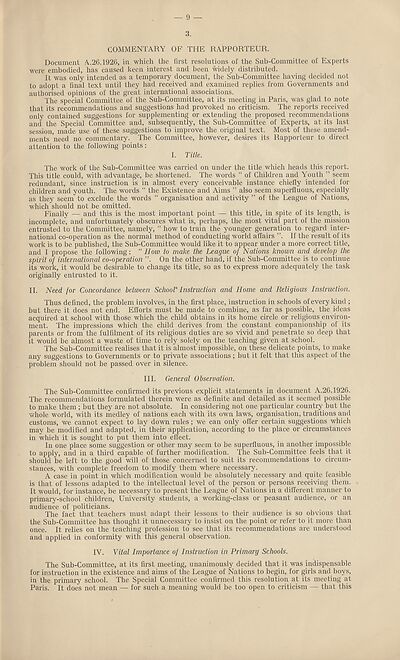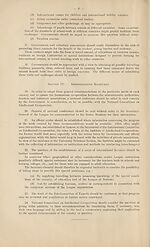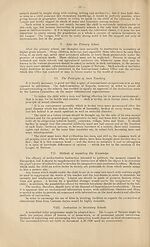Download files
Complete book:
Individual page:
Thumbnail gallery: Grid view | List view

9 —
3.
COMMENTARY OF THE RAPPORTEUR.
Document A.26.1926, in which the first resolutions of the Sub-Committee of Experts
were embodied, has caused keen interest and been widely distributed.
It was only intended as a temporary document, the Sub-Committee having decided not
to adopt a final text until they had received and examined replies from Governments and
authorised opinions of the great international associations.
The special Committee of the Sub-Committee, at its meeting in Paris, was glad to note
that its recommendations and suggestions had provoked no criticism. The reports received
only contained suggestions for supplementing or extending the proposed recommendations
and the Special Committee and, subsequently, the Sub-Committee of Experts, at its last
session, made use of these suggestions to improve the original text. Most of these amend¬
ments need no commentary. The Committee, however, desires its Rapporteur to direct
attention to the following points :
I. Title.
The work of the Sub-Committee was carried on under the title which heads this report.
This title could, with advantage, be shortened. The words “ of Children and Youth ” seem
redundant, since instruction is in almost every conceivable instance chiefly intended for
children and youth. The words “ the Existence and Aims ” also seem superfluous, especially
as they seem to exclude the words “ organisation and activity ” of the League of Nations,
which should not be omitted.
Finally — and this is the most important point — this title, in spite of its length, is
incomplete, and unfortunately obscures what is, perhaps, the most vital part of the mission
entrusted to the Committee, namely, “ how to train the younger generation to regard inter¬
national co-operation as the normal method of conducting world affairs ”. If the result of its
work is to be published, the Sub-Committee would like it to appear under a more correct title,
and I propose the following: “ How to make the League of Nations known and develop the
spirit of international co-operation On the other hand, if the Sub-Committee is to continue
its work, it would be desirable to change its title, so as to express more adequately the task
originally entrusted to it.
II. Need for Concordance between School Instruction and Home and Religious Instruction.
Thus defined, the problem involves, in the first place, instruction in schools of every kind ;
but there it does not end. Efforts must be made to combine, as far as possible, the ideas
acquired at school with those which the child obtains in its home circle or religious environ¬
ment. The impressions which the child derives from the constant companionship of its
parents or from the fulfilment of its religious duties are so vivid and penetrate so deep that
it would be almost a waste of time to rely solely on the teaching given at school.
The Sub-Committee realises that it is almost impossible, on these delicate points, to make
any suggestions to Governments or to private associations; but it felt that this aspect of the
problem should not be passed over in silence.
III. General Observation.
The Sub-Committee confirmed its previous explicit statements in document A.26.1926.
The recommendations formulated therein were as definite and detailed as it seemed possible
to make them ; but they are not absolute. In considering not one particular country but the
whole world, with its medley of nations each with its own laws, organisation, traditions and
customs, we cannot expect to lay down rules; we can only offer certain suggestions which
may be modified and adapted, in their application, according to the place or circumstances
in which it is sought to put them into effect.
In one place some suggestion or other may seem to be superfluous, in another impossible
to apply, and in a third capable of further modification. The Sub-Committee feels that it
should be left to the good will of those concerned to suit its recommendations to circum¬
stances, with complete freedom to modify them where necessary.
A case in point in which modification would be absolutely necessary and quite feasible
is that of lessons adapted to the intellectual level of the person or persons receiving them.
It would, for instance, be necessary to present the League of Nations in a different manner to
primary-school children, University students, a working-class or peasant audience, or an
audience of politicians.
The fact that teachers must adapt their lessons to their audience is so obvious that
the Sub-Committee has thought it unnecessary to insist on the point or refer to it more than
once. It relies on the teaching profession to see that its recommendations are understood
and applied in conformity with this general observation.
IV. Vital Importance of Instruction in Primary Schools.
The Sub-Committee, at its first meeting, unanimously decided that it was indispensable
for instruction in the existence and aims of the League of Nations to begin, for girls and boys,
in the primary school. The Special Committee confirmed this resolution at its meeting at
Paris. It does not mean — for such a meaning would be too open to criticism — that this
3.
COMMENTARY OF THE RAPPORTEUR.
Document A.26.1926, in which the first resolutions of the Sub-Committee of Experts
were embodied, has caused keen interest and been widely distributed.
It was only intended as a temporary document, the Sub-Committee having decided not
to adopt a final text until they had received and examined replies from Governments and
authorised opinions of the great international associations.
The special Committee of the Sub-Committee, at its meeting in Paris, was glad to note
that its recommendations and suggestions had provoked no criticism. The reports received
only contained suggestions for supplementing or extending the proposed recommendations
and the Special Committee and, subsequently, the Sub-Committee of Experts, at its last
session, made use of these suggestions to improve the original text. Most of these amend¬
ments need no commentary. The Committee, however, desires its Rapporteur to direct
attention to the following points :
I. Title.
The work of the Sub-Committee was carried on under the title which heads this report.
This title could, with advantage, be shortened. The words “ of Children and Youth ” seem
redundant, since instruction is in almost every conceivable instance chiefly intended for
children and youth. The words “ the Existence and Aims ” also seem superfluous, especially
as they seem to exclude the words “ organisation and activity ” of the League of Nations,
which should not be omitted.
Finally — and this is the most important point — this title, in spite of its length, is
incomplete, and unfortunately obscures what is, perhaps, the most vital part of the mission
entrusted to the Committee, namely, “ how to train the younger generation to regard inter¬
national co-operation as the normal method of conducting world affairs ”. If the result of its
work is to be published, the Sub-Committee would like it to appear under a more correct title,
and I propose the following: “ How to make the League of Nations known and develop the
spirit of international co-operation On the other hand, if the Sub-Committee is to continue
its work, it would be desirable to change its title, so as to express more adequately the task
originally entrusted to it.
II. Need for Concordance between School Instruction and Home and Religious Instruction.
Thus defined, the problem involves, in the first place, instruction in schools of every kind ;
but there it does not end. Efforts must be made to combine, as far as possible, the ideas
acquired at school with those which the child obtains in its home circle or religious environ¬
ment. The impressions which the child derives from the constant companionship of its
parents or from the fulfilment of its religious duties are so vivid and penetrate so deep that
it would be almost a waste of time to rely solely on the teaching given at school.
The Sub-Committee realises that it is almost impossible, on these delicate points, to make
any suggestions to Governments or to private associations; but it felt that this aspect of the
problem should not be passed over in silence.
III. General Observation.
The Sub-Committee confirmed its previous explicit statements in document A.26.1926.
The recommendations formulated therein were as definite and detailed as it seemed possible
to make them ; but they are not absolute. In considering not one particular country but the
whole world, with its medley of nations each with its own laws, organisation, traditions and
customs, we cannot expect to lay down rules; we can only offer certain suggestions which
may be modified and adapted, in their application, according to the place or circumstances
in which it is sought to put them into effect.
In one place some suggestion or other may seem to be superfluous, in another impossible
to apply, and in a third capable of further modification. The Sub-Committee feels that it
should be left to the good will of those concerned to suit its recommendations to circum¬
stances, with complete freedom to modify them where necessary.
A case in point in which modification would be absolutely necessary and quite feasible
is that of lessons adapted to the intellectual level of the person or persons receiving them.
It would, for instance, be necessary to present the League of Nations in a different manner to
primary-school children, University students, a working-class or peasant audience, or an
audience of politicians.
The fact that teachers must adapt their lessons to their audience is so obvious that
the Sub-Committee has thought it unnecessary to insist on the point or refer to it more than
once. It relies on the teaching profession to see that its recommendations are understood
and applied in conformity with this general observation.
IV. Vital Importance of Instruction in Primary Schools.
The Sub-Committee, at its first meeting, unanimously decided that it was indispensable
for instruction in the existence and aims of the League of Nations to begin, for girls and boys,
in the primary school. The Special Committee confirmed this resolution at its meeting at
Paris. It does not mean — for such a meaning would be too open to criticism — that this
Set display mode to:
![]() Universal Viewer |
Universal Viewer | ![]() Mirador |
Large image | Transcription
Mirador |
Large image | Transcription
Images and transcriptions on this page, including medium image downloads, may be used under the Creative Commons Attribution 4.0 International Licence unless otherwise stated. ![]()
| League of Nations > International > International committee on intellectual co-operation > (9) |
|---|
| Permanent URL | https://digital.nls.uk/195219372 |
|---|
| Shelfmark | LN.XII |
|---|
| Description | Over 1,200 documents from the non-political organs of the League of Nations that dealt with health, disarmament, economic and financial matters for the duration of the League (1919-1945). Also online are statistical bulletins, essential facts, and an overview of the League by the first Secretary General, Sir Eric Drummond. These items are part of the Official Publications collection at the National Library of Scotland. |
|---|---|
| Additional NLS resources: |
|

